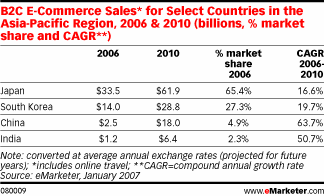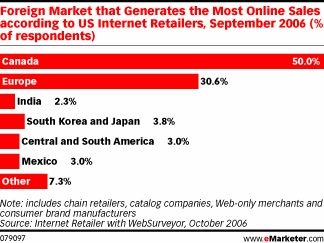"Japan and South Korea, the region's largest markets — according to eMarketer's calculations — had online sales volumes of $34 billion and $14 billion, respectively, last year," says Jeffrey Grau, eMarketer senior analyst and the author of the new Asia-Pacific B2C E-Commerce: China, Japan and South Korea report. "Both have strong e-commerce infrastructures and tried and tested online retail business models, and they will be stable growth markets for the foreseeable future."

"Then there are the up-and-comers, best epitomized by China and India," says Mr. Grau, "where a growing middle class, infrastructure investment and more experienced online shoppers are accelerating growth rates."
The Asia-Pacific region represents many large markets, and many fast-growing markets, which are of course attractive to Western retail e-commerce firms.
But there is a problem. No, scratch that, there are many problems.
"Language barriers, unfamiliar business practices, restrictive government regulations and fierce competition conspire in different proportions to thwart the ambitions of Internet companies from the US and Europe attempting to enter Asia-Pacific markets," says Mr. Grau. "And the competition facing Western firms comes not only from domestic rivals, but also regional ones like South Korea's Gmarket, which plans to expand to Japan and China soon."
As big as they are, according to Internet Retailer, Asia-Pacific markets represent only a small fraction of the revenues generated by US online retailers.

The Asia-Pacific region is much more than just a new sales frontier, however.
"It is also a stage for new online trends and novel e-commerce models that can be instructional for other countries," says Mr. Grau.
"Certain aspects of the e-commerce models adopted by Japan and South Korea, intended to help security-conscious consumers and small e-tailers, could be imitated in countries where online retailing is at an early stage of development," says Mr. Grau. "Also, a population of young cyber activists in South Korea is at the vanguard of social networking and blogging. What these enthusiastic netizens do online today could lead to new modes of online shopping tomorrow."
In addition, to see the future of mobile e-commerce, Western firms are looking to Japan and South Korea — who are at the forefront of m-commerce applications.





